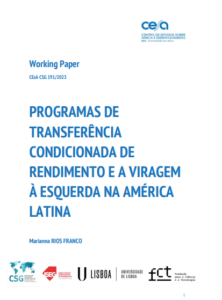Working Paper CEsA 191/2023 analyses conditional cash transfer programmes and the left turn in Latin America
 CEsA has published its fourth Working Paper of 2023: “Programas de Transferência Condicionada de Rendimento e a Viragem à Esquerda na América Latina” (nº 191/2023), in Portuguese, authored by Marianna Rios Franco, Master in Development and International Cooperation from ISEG – Lisbon School of Economics and Management.
CEsA has published its fourth Working Paper of 2023: “Programas de Transferência Condicionada de Rendimento e a Viragem à Esquerda na América Latina” (nº 191/2023), in Portuguese, authored by Marianna Rios Franco, Master in Development and International Cooperation from ISEG – Lisbon School of Economics and Management.
Click here to download the Working Paper n. 191/2023: https://www.repository.utl.pt/handle/10400.5/27516
Read the abstract below:
In the last three decades, two phenomena have emerged and expanded in waves in Latin America: Conditional Cash Transfer (CCT) programs and the arrival of left-wing governments to power. This scenario is set in a historic period of economic recovery in the Region, especially with the “commodity boom”, providing the resources and political space needed to govern on the left and promote social policies. This study works with the research hypothesis that left-wing governments were the ones that most created, supported and expanded this type of public policy in Latin America in the period 2000-2020. Thirthy-two CCTs were mapped, implemented by 18 countries in the Region, as well as their presidents and policy guidelines. In addition to reporting on the evolution of the implementation of these policies, this work carried out a quantitative analysis based on IDB and ECLAC databases about the beginning and end of these programs, as well as the evolution of the coverage of beneficiaries. The main conclusions indicate that the hypothesis is only partially and limitedly confirmed. In short, left-wing governments achieved the highest numbers in absolute terms regarding the creation and expansion of CCTs in the region, but centrist governments achieved the highest rates of new programs and increased coverage (in relative terms) – with subtle differences in outcomes between left-wing and centrist governments. Thus, we conclude that the adoption and expansion of CCTs among Latin American countries in the last two decades was largely independent of the political orientation of the governments considered. It was, above all, a regional stake that crossed ideologies, historical moments and economic crises to redistribute income over the last 20 years to more than 100 million people.
Author: CEsA Communication (comunicacao@cesa.iseg.ulisboa.pt)
Image: CEsA/Reproduction





